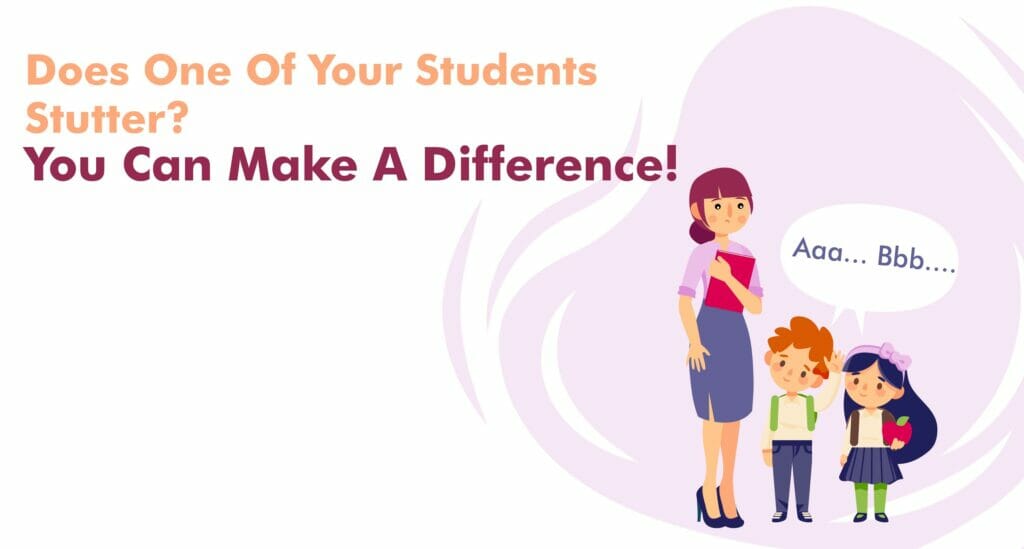You may be here because you have a student in class who stutters, or you want to know what you should do if you ever have a student with speech disfluencies.
Either way, it’s a commendable effort and we will try to help you with all the information you will need to understand stuttering, the effects of stammering on a child and how you can guide them.
What Sets a Stuttering Student apart from the Fluent Speakers?
Firstly, let’s get to the nitty-gritty of stuttering.
It is a childhood-onset speech fluency disorder.
Stuttering has several causes including genetics, family history and anomalies in the brain structure.
Stress and anxiety make it even more difficult for someone who stutters to express themselves in front of people.
Children are especially vulnerable to changes in their environment, anxiety and pressure.
Identifying Hidden Stuttering in a Student
Younger children may not be as affected by their stutter and join conversations in class more easily.
As children grow, they become more aware of their stammer and may become more withdrawn.
Here are a few signs that your student may be trying to hide a stutter –
- You may have noticed that children who stutter tend to remain quieter than other children in your class.
- They tend to shy away from answering questions or participating in group tasks.
- They may even pretend to not know the answer just to avoid speaking.
- You may even find others mocking or bullying them for their speech disfluencies.
What Threatens Your Stuttering Student?
Everyday situations may threaten or unsettle children who stutter.
Such situations may seem benign to you and me, and anyone else who has never stuttered before, but some of the instances we will discuss below can be jarring for a child with speech disfluency –
- Asking for help from their classmates or the teacher
- Answering time-bound questions
- Reading out loud in front of the entire class
- Telling the cafeteria person what they want for lunch
- Oral reports
- Timed fluency tests
- Joining their classmates for playtime or group activities
- Volunteering for tasks
How to Help a Stuttering Student?
As the teacher, you have the responsibility to ensure that every child in your class feels comfortable, confident and gets the right education.
It is also your duty to see that the child who stutters gets the chance to participate in group activities and gains confidence from their in-class interactions.

Not every school has an on-campus speech therapist. So, if you notice that the child’s speech disfluency is causing them excessive distress and keeping them from reaching their full potential as a student, you may consider talking to their parents.
Encourage them to seek the counsel of a speech-language therapist in your area. Early intervention can help children recover much faster than adults.
You can always follow this short guide to make your classroom more inclusive for anyone with speech disfluencies –
Establish Rules For Speaking in Class
This should be true for any classroom with and without children who stutter. There should be no interruptions while a child talks. If someone wants to share, they can raise their hand and politely ask for permission to speak. There shouldn’t be any signs of hurrying or annoyance among the listeners. Anyone with something to say should be respected, and it is your responsibility to teach that to your class.
Give Additional Time For Responses
Not every child has the same skills and talents. Some can finish arithmetic problems in a jiffy, while others can sing like nightingales. Every child needs the right environment to flourish. So, why shouldn’t the child with a stutter get the same opportunity? Allow them extra time to finish answering a question. Do not rush them.
Speak Softly and Unhurriedly
Children who stutter often have parents who have a fast pace of speech. You can relieve some of the pressure they feel at home by adopting a slow and relaxed pace while talking. Show them that they don’t need to hurry through their words. They have all the time in the world to think, find the right words and express themselves.
Always be Patient and Interested
Anyone who stutters suffers from the insecurity of sounding trite or driving listeners away from them. It is important that you not only maintain eye contact but also praise their ideas. If they finish saying a particularly long or complex sentence or use a new word, show them your appreciation. It’s not how they say it, but what they say that should genuinely interest you.
Refrain From Advising The Child Who Stutters
The child in question has already received hundreds of pieces of unwanted advice. Don’t tell them to “slow down,” “breathe deeply,” or “start over.” Chances are that the child already knows they sound different from the others. There’s no point questioning their confidence and self-esteem as well. Instead, be a good listener. If a particular sentence or part of a sentence is difficult to understand, it is alright to politely ask them to go over it because you couldn’t understand what he/she said.
Include Group Activities
Encourage class activities like reading aloud together (choral reading), and reciting rhythmic poems that are in the syllabus. These are therapy techniques that work marvelously well in treating stuttering. You can make them fun by dividing the class into groups and getting them to recite different parts of a poem or reading excerpts from stories in unison.
How to Prevent Bullying of A Stuttering Child at School?

Talk more about stuttering just like any other issue.
Don’t make it out to be something a person has to be ashamed of.
Discuss Stuttering In Class
If you notice others being mean to the child who stutters or simply ignoring them, you should consider hosting a session on speech disfluencies.
Make it simple so the students can understand.
Deliver the message clearly.
Include stories of now-famous people who used to stutter and be sure to include tips on why one shouldn’t bully someone who talks differently.
Preventing bullying is a must.
The world needs to know more about stuttering instead of mocking people who stutter. Starting with your class is a great idea!
Talk To Other Teachers as Well
Make sure you share your ideas of inclusion with the other educators in your school.
The child should receive fair and equal treatment not only from you but also from the other teachers.
If necessary, share what you have found out about stuttering and guides to helping someone who stutters.
Talk To The Student Privately
If the student is particularly withdrawn and jittery about participating in group tasks, you can give them some personal time to address their speech problem. Ask them about any trouble they face inside and outside your class. Sometimes, simply talking can help you find out if the student is feeling bullied.
As their teacher, it’s your responsibility to keep an eye out for bullying in the school. If you see someone mocking the child who stutters, instead of admonishing them openly, you can ask the bullying child to make a presentation or submit a report on stuttering.
It will both educate the child and teach them to show mutual respect to someone who stutters.
Learn to be a good listener irrespective of the age of the person who stutters. If the stuttering student is already seeing a speech-language pathologist, which you can find out from their parents, learn about their progress, and explore reasonable expectations from the child.
Supporting stuttering student is not that difficult when you have the right information. You can find out more about the myths associated with stuttering and what not to say to someone who stutters before you head back to the classroom.










